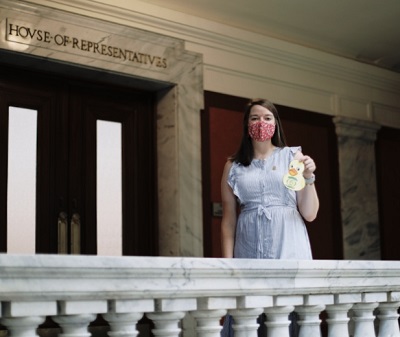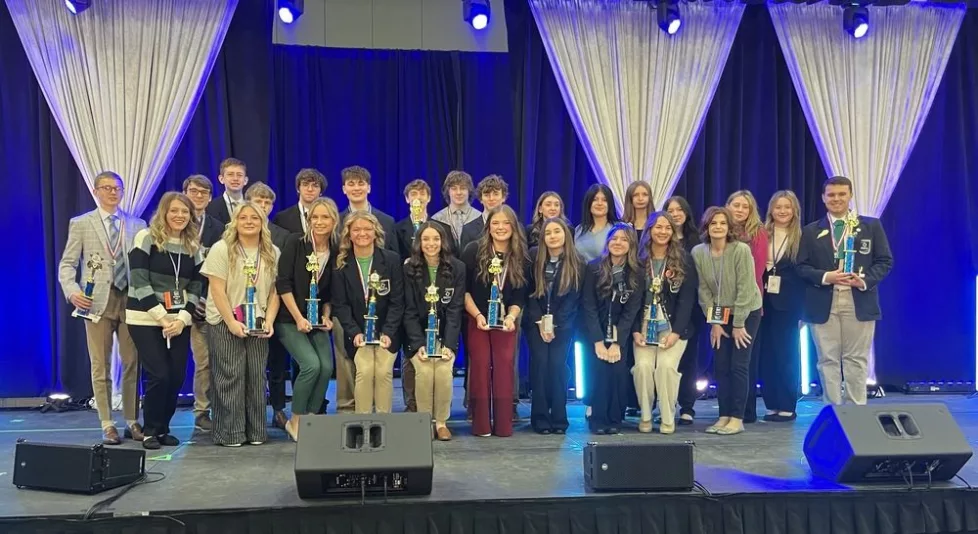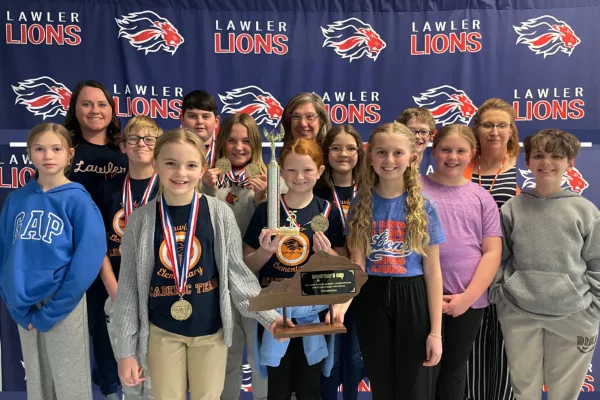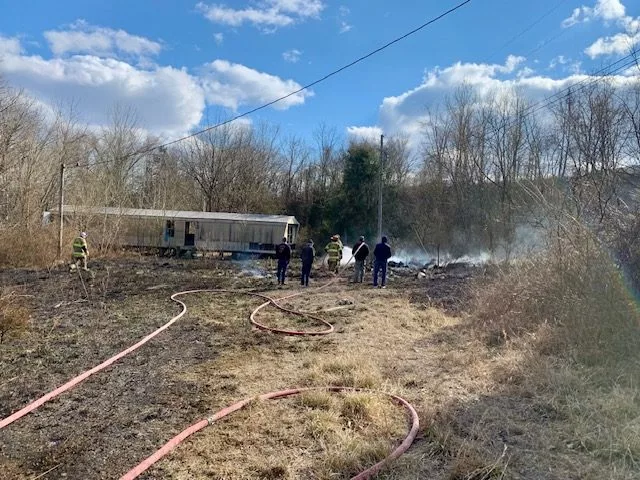
Many of my colleagues and I returned to Frankfort to close out the last week in July with a busy schedule of interim committee meetings.
As I’ve mentioned before, these meetings provide an opportunity for members to research and prepare for the upcoming 2021 Regular Session in January.
Before I get started on the committee updates, I want to share about my special guest that joined me in Frankfort this week. Have you met Flat Quacky yet? The Grayson County Alliance (GCA) is celebrating their 5th Annual Ducking Hunger Regatta in September. As a way to support the 1-in-7 that are hungry in Grayson County, GCA has created a printable for everyone to have their own Flat Quacky. This is a simple way to highlight the great things they are doing for our community. Did you know that hundreds of families have been served during the pandemic thanks to their hard work and dedication?
To learn more about how you can be involved check out https://gc-alliance.com/ducking-hunger-regatta.
This week provided some valuable insight and I hope you will take a few minutes to read this update and reach out to me if you have any questions. Here are some updates on what all happened: Interim Joint Committee on State Government: Kentucky Secretary of State Michael Adams testified concerning what this November’s General Election might look amid the ongoing COVID-19 pandemic. While still deeply involved in planning, Secretary Adams shared with members that he envisions it consisting of a combination of absentee voting, early in-person voting, and voting on Election Day.
Rather than expanding absentee ballots as much as he did in the June Primary, Adams said he was more comfortable with early, in-person voting to decrease crowded polls on Election Day. The June primary was the most expensive election in Kentucky history and the state spent two-thirds of the Coronavirus Aid, Relief and Economic Security (CARES) Act money it received from the federal government. As of now, Kentucky only has $2.5 million of CARES Act money for the November election.
Veterans, Military Affairs, and Public Protection Interim Committee: Members discussed the impact COVID-19 on our veterans, their health, and quality of life. The four state operated veterans’ nursing homes have temporary stopped accepting new veterans because of COVID-19, but they plan to resume admissions in late August or early September. I am happy to share that there have been no reported cases of coronavirus among Kentucky residents’ four veterans homes. That is excellent news to hear!
Only seven staff members have tested positive, and it looks like two of those were false-positives. Veterans’ nursing homes have continued vigorous testing for all staff and residents in addition to taking other aggressive measures. The Department of Veteran’s Affairs is expanding telemedicine with federal veteran’s medical centers in Lexington, Louisville, and Marion, Illinois. This has helped get veterans the health care they need without increasing exposure to the coronavirus. The department also received $3 million in April from the CARES Act, which has been instrumental in supporting veteran homes during this time.
Interim Joint Committee on Local Government: Committee members discussed the use of no-knock warrants following a narcotics investigation in Louisville that led to the death of Breonna Taylor. According to a presentation he gave to the committee, Senate President Robert Stivers is working on a bill to regulate the use of this type of warrant.
A no-knock warrant allows law enforcement officers to enter a property without announcing their presence. When the use of these types of orders is needed, the situation is considered dangerous for law enforcement officer’s presence to be known. While they are appropriate in some situations, they can be potentially dangerous and we want to do all we can to ensure they are used with restraint. The bill’s draft calls for no-knock warrants to be conducted by trained personnel in tactical situations, such as a SWAT team. I am very appreciative of what our law enforcement officers do to keep our communities safe.
Interim Joint Committee on Health, Welfare, and Family Services: According to public health officials, Kentuckians have handled COVID-19 fairly well and have a 2.7 percent mortality rate. The world COVID mortality rate is 4.1 percent, while the national mortality rate is 3.6 percent.
During this month’s meeting, committee members discussed several regulations relating to the pandemic. Regulations are basically the rules the executive branch puts into place after the legislative branch passes a law. Our review of regulations is important to ensuring state agencies are putting law into practice properly. Part of the discussion included information about the governor’s mandate to wear masks or face coverings in public situations where social distancing is not possible.
I want to note that most legislators, including myself, agree that we need to follow guidance from our medical professionals and public health officials, and that includes wearing a mask. However, many members expressed concern over the Cabinet for Health and Family Services, gaining the ability to impose our citizens with fines and penalties if seen violating the order. There are no Kentucky laws that would give the Cabinet this ability; it is simply illegal.
As state legislators, we have the constitutional oversight to ensure all regulations and laws are handled appropriately. This regulation could be a violation of due process.
Interim Joint Committee on Licensing, Occupations, and Administrative Regulations- Alcoholic Beverage Control (ABC) Commissioner Allyson Taylor testified before members, providing an update on the implementation of legislation passed during the 2020 session.
HB 415 allows a direct path for producers of alcohol to sell and ship in and out of Kentucky to consumers worldwide. No more than ten liters of distilled spirits, cases of wine, and cases of malt beverages per month could be shipped to an individual. The packages must be clearly labeled and deliver signed for by someone 21 or older. And, shipping to communities where local laws prohibited alcohol sales would still be banned. Kentucky is rich in tourism, and a lot of that is attributed to the bourbon industry. However, because of COVID-19, many of our businesses are struggling.
Interim Joint Committee on Economic Development and Workforce Investment: Members heard testimony from Muncie McNamara, Former Executive Director of the Office of Unemployment. He described the steps the administration took when the governor shut down Kentucky’s economy on March 16.
There has been another security breach in the state’s unemployment insurance program, which is unacceptable. McNamara was offered the position in Unemployment Insurance in December of 2019 and terminated without cause on May 5 after raising concerns about a variety of issues within the Unemployment Insurance Program.
During his testimony, McNamara described a lack of communications and planning within the administration that led to poor morale and a sense that state employees working in unemployment insurance were at fault for the massive number of unprocessed and unpaid claims. He also recalled sharing his concerns about the use of unemployment insurance funds to pay benefits not approved by the federal government.
It was clear to members of the committee that there was no transparency during the unemployment debacle from higher leadership in the administration. Unfortunately, there are still many Kentuckians and constituents in the 18th District, who have yet to receive payments. There needs to be accountability for the people of our Commonwealth.
Interim Joint Committee on Tourism, Small Business, and Information Technology: The Kentucky Association of Manufacturers, representing a huge segment of Kentucky jobs and approximately $38 billion in annual gross domestic product and employs more than 250,000 Kentuckians, provided testimony to the committee. Charter Communications and the Kentucky Telecommunications Association also presented. They described the internet challenges COVID has created for Kentucky families and possible 2021 legislation to provide solutions to those challenges.
With many school districts deciding to start the school year virtually, Kentuckians must have access to quality Internet. The meeting wrapped up with the Kentucky Education and Workforce Development information technology director, who explained the process of the unemployment data portal and provided an update about future changes that need to be made to help the system succeed. The outdated system needs a complete overhaul that will cost millions of dollars, but the project was approved in 2017 and is still in the bidding stage.
Even though it is currently the interim, I am still a voice for you here in Frankfort and want to hear from you regarding concerns or issues. I can be reached through the toll-free message line at 1-800-372-7181 or here at home. You can also contact me via e-mail at Samara.Heavrin@lrc.ky.gov. Also, please feel free to visit the legislature’s website at www.legislature.ky.gov.
(Photo: Rep. Samara Heavrin with Flat Quacky at the state Capitol)
Rep. Samara Heavrin








